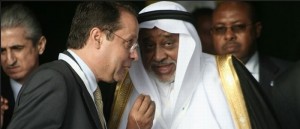Addis Fortune | 24 November 2009
Mohammed Ali Al-Amoudi was pivotal in the preparation and organisation of both the Saudi-East African Forum, which took place at the United Nations Conference Centre (UNCC), and the corresponding exhibition at the Millennium Hall, spending 30 million Br renovating the hall.
The renovation included asphalting the surface of the compound as well as refurbishing the interior. He built the Millennium Hall on Africa Avenue (Bole Road) for the Ethiopian Millennium at a cost of 10 million dollars (90 million Br, according to the exchange rate of the time).
The Saudi delegation, which included Abdullah bin Ahmed Zainal Alireza, minister of Commerce and Industry and three other Saudi ministers, had representatives from 50 large Saudi companies. On the other end were representatives from seven African countries, including Prime Minister Meles Zenawi, President Ismail Guelleh of Djibouti and Somali President Sharif Ahmed including, Paul Kagame, president of Rwanda.
Kenya, Tanzania, Uganda and Rwanda were represented by top government officials. The forum brought together 680 delegates from both sides, excluding the Ethiopian participants.
These representatives were lodged at the Sheraton, Hilton, Intercontinental and Wasamar hotels.
The 50 Saudi companies and Ethiopian regional investment bureaus were represented at the exhibition, the latter to showcase the suitability for investment of their respective regions. One participant was Saudi Star Agricultural Development Plc, established by Al-Amoudi following the green light from Saudi King Abdullah bin Abdul Aziz to supply the Middle Eastern country with rice. This happened after Al-Amoudi had presented rice samples to the king.
This company, through which Al-Amoudi sponsored the Saudi-East Africa Forum, was promoting itself at the exhibition as the first rice farm in Ethiopia.
Sources close to Al-Amoudi said that the king has shown an interest in seeing other Saudi companies involved in rice farming after seeing the samples presented by Al-Amoudi, who is said to have been asked to facilitate the process. Accordingly, the Al-Amoudi is said to have spoken with and gained the support of Prime Minister Meles Zenawi.
“The global food crisis is the raison d’être of King Abdullah’s agricultural initiative. Saudi Arabia is committed not only to combating hunger, providing support for the host country, but also to generate exports,” said Minister Abdullah in his speech.
Ethiopia has 74 million hectares of land that is said to be suitable for agriculture out of its total area of 111.5 million hectares. However, less than 15 million hectares is currently in use.
“We have vast land resources and a lot of water resources. If investors with potential come, we will give them land,” said Aberra Deressa(PhD), state minister of Agriculture and Rural Development.
The Investors Support Directorate, which he heads, is responsible for giving large tracts of land to investors.
“Most Saudi investments [in Ethiopia] have been in the manufacturing and hospitality sectors. This has been the focus so far, but we expect a sizeable increase in the kingdom’s investment in agriculture as a result of its decision to invest in cereals,” said Prime Minister Meles Zenawi in a recent interview with Arab News.
The Saudi minister said that the king himself had taken the initiative to see more work done in agriculture and agro-processing investments, with billions of dollars likely to be allocated from the Saudi government, the Islamic Development Bank and other sources.
A number of countries have for sometime now been taking land in other poorer countries to grow food for their own people. Among such countries are Russia, China and India.
The Saudi minister says that his country’s approach is different, including using some of the products for host market uses. He also said that his country would finance infrastructure projects in host countries through credit provided by the Saudi Development Fund and other institutions.
The delegation had one-on-one talks with the Prime Minister, Minister of Trade and Industry Girma Birru and other top government officials after the forum and exhibition were completed.
This official said that the delegates were not very satisfied with the banking and customs system in Ethiopia as well as the infrastructure development at industrial zones in Ethiopia. He added that stiff competition is expected from Rwanda, which has been named the world’s top performer in the World Bank’s Doing Business 2010 report.
Ethiopia can still expect to sign a number of investment agreements with the kingdom some time soon, according to the same source.
By WUDINEH ZENEBE
SPECIAL TO FORTUNE











